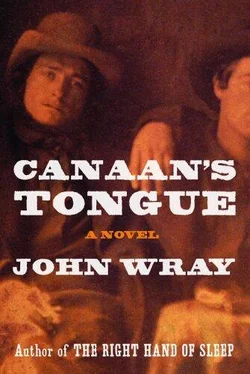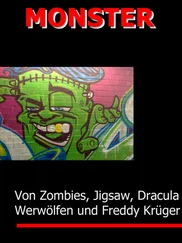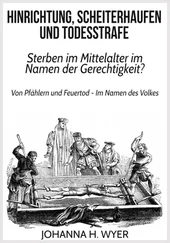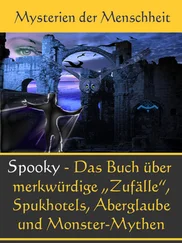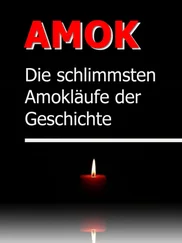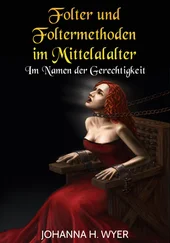Neither of us answer. Parson beckons us closer.
“Canaan’s tongue is the language of future things.” His voice drops to a whisper. “The future, gentlemen, is its one and only tense. Soon— very soon — there will be no other language. Some will speak the tongue, some will obey it. And each of us will be asked to choose between those two societies.” Parson cocks his head at Virgil. “Which will you choose, Mr. Ball?”
“Which did Harvey choose?”
But Parson has already turned his back on us, tipping and bobbing toward the house as if he had paddle-wheels for feet.
“He’s a great one for riddles,” I mutter as we watch him go.
“He knows who killed Harvey,” Virgil says. “He knows everything about it.”
I nod. “What’s more, he knows you think so. And he doesn’t seem to mind.”
“But there is something else he minds,” Virgil says, keeping his eyes on Parson. “Something he wants us not to see. Behind all his sport there’s a living fact — or perhaps only a question — that he’s desperate to keep us from discovering. He wants us in the dark, Oliver. Like the girls at that damn supper.”
“If that’s what he wants, my hat goes off to him,” I say.
“Canaan’s tongue is the key to it—; that much I’m sure of.” Virgil chews on his lip for awhile. “It means what Parson says it does, of course, but it means something else besides.” He turns to me. “And so does that cattle-brand. That shape. The one in Harvey’s letter.”
“Cattle-brand?” I say. “What cattle-brand? Are you speaking Parson’s English now?”
“I had a vision this morning,” Virgil says.
I give him a good hard look. His face is solemn as an urn.
“Spare me your wheels of fire, Virgil. They become a man of reason poorly.”
He takes a nervous breath and clutches at my sleeve, the same sleeve that Parson clawed at not five minutes gone. “Do you recollect that shape in Harvey’s letter?”
I think a moment. “That boxy sort of scribble? From the meeting at the Old Grange?”
“That’s the one.” His voice goes shrill and eager. “I’ve seen that shape before, Oliver.”
I look toward the house. Parson is nowhere to be seen.
“So have I,” I say.
Virgil all but vaults into the air. “I knew it! I knew it! Where was it, Oliver? Did you manage to find out what it means?”
I regard him evenly for the briefest of instants, allowing myself to commit his slack-jawed, slavering look to memory. My satisfaction has arrived, easily and completely, as I knew it would. I take Virgil’s full measure, remind myself that he sent Kennedy to kill me, then calmly free my shirt-sleeve from his grip.
“It means ‘Suffer fools,’ Virgil,” I say to him. “And you’ve been had for one. That sign is a Cherokee fool-catcher.”
SOON ENOUGH, Dodds says. Didn’t it come down on me soon.
Virgil come jabbering about that hole. I knew when I dugged it a body might see it and come round fussing. Praps I reckoned it. Praps I reckoned he would come.
Virgil find me by the griddle in the cook-house, pulling cuts off a ham-brace and stewing sundry greens.
Dodds, he say. I’m puzzled by your diggings.
I shake my head. I’m puzzlit by them, too.
Praps we can puzzle it out together, he say. He give a cough. Who said to dig behind the tobacco shed?
Parson, I say, fussing at the ham.
Parson, he say. All right.
I commence to cutting onions.
What for, Dodds? Did he say what for?
He said most likely they was more to come.
Virgil face go flat. More whats? More burials? More holes?
More killings, I say.
Virgil hush.
So, I say. I askit could I get started.
Dodds, Virgil say. He voice gone soft and jumpish. Did Parson give a reason why?
I tolt you it, I say. They likely come more killings—
Yes but why, Dodds? Why would there be more?
I pull my shoulders up. I askit that already.
Virgil swallow and shuffle and blink. What did Parson say?
I take in a longish breathe. I grin at Virgil and scratch behind my ears and watch him stew and fret himself. Then I give it to him like a sweet.
Parson said to me, Three reasons, Doddsbody.
Three reasons, Virgil say. He say it slowly back to me, like a lesson.
That’s right. Then Parson put three fingers up. Reason one! he say. You know, Doddsbody, that to meet a friend on the street, and to pass him by like a stranger, is a sure and proven death-sign for that friend.
Virgil hush for a time. Well?
Everybody on the river know that, Parson, I tolt him. Right, he say. Reason two! You must also know, Doddsy, that two persons saying the same thing at the same time, in one another’s company, means a violent ending for one of them.
Virgil open he mouth and close it.
Yes, Parson, I said. I know it. Then Parson tappit me on the collar. What are the tenants of this house, Charlie, but a group of friends living together as enemies, passing one another by without knowing it, and reciting the same words over and over, all of them together, like deaf-mutes at a mass?
Virgil eyes go slantish.
There you have it, Marse.
You ape our Parson beautifully, Dodds. You might have passed for a man of God yourself, just now. You sound positively schooled.
And me just a tom-fool nigger, I say.
Virgil blink and go flushed. I’m sorry, Dodds. I meant no harm by it. Go on.
Well—
Go on, Dodds! Tell me the rest.
All right, I say. That’s all, Parson? I askit. That’s all, Doddsbody, he say.
Virgil squint again. But—
But you still got one finger in the air, Parson, I tolt him. That were only the two reasons.
Bless you! What did he say to that?
I’ll tell you. Parson look at he third finger like he never seen it yet. Oh! That, he say. That’s just my lumbago, Charlie boy.
Virgil face turn to mush. That’s all? That’s everything? That’s all he said to you?
You know how Parson get, Virgil. When you try to press him.
Yes, say Virgil. Yes. I know.
We hush a spell, looking toward the river.
Dodds, he mumble.
Present!
Has he mentioned Canaan’s tongue to you?
Tongue of which?
Never mind, Virgil say. He take a breath.
Right, I say. Well. If you allow, Marse Virgil, they a power of work—
What about this, then? he say. He pull out a paper and fuss it open and hold it under my nose like a kerchief. Have you come across this anywhere? This symbol?
I give the paper a turn. I knew what it was before I seen it. I tip my head at him and grin. Sure, Marse Virgil. I come across it once.
You have? Then—
That the Victoria diamint! I know that much. They got a paste of it in Memphis. I seen it in a show.
HE’S THERE BELOW MY WINDOW, Clementine says. Virgil is. Walking up and down.
Not too proud to look up and see me—: afraid to. Since he caught me outside the parlor door and I told him what I know he’s kept well clear of me. Clear of me but not of the thought of me, not of the part of him that thinks about me six times every hour, which is why he’s there. There below my window, not once looking up. Trusting that I’m looking down at him.
Which I am. I’m watching him, bored to death and thoughtless, in this raggedy old shift that I thought would keep trouble off me, but hasn’t trouble risen up just the same. The very same as always.
It has. I might be wearing the clothes I was birthed in for all the peace I’ve gotten in this house.
He moves hunched and buckled, an old habit. To keep that witchy eye of his from passers-by. There’s nobody going to pass him on that old lawn full of blight but old customs die hard, as they say. He’s looked people in the face no more than ten times in his life. Poor sly Virgil. Six of those times it was me.
Читать дальше
